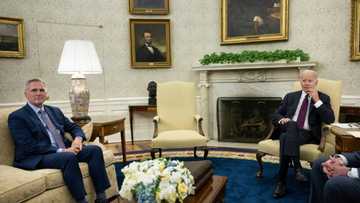Ex-Audi boss pleads guilty in German 'dieselgate' trial

Source: AFP
PAY ATTENTION: Сheck out news that is picked exactly for YOU ➡️ click on “Recommended for you” and enjoy!
Ex-Audi CEO Rupert Stadler pleaded guilty at his "dieselgate" fraud trial in Germany on Tuesday, becoming the highest-ranking former executive to make a confession in the emissions cheating scandal that rocked the car industry.
Stadler, 60, admitted at a district court in Munich that he allowed vehicles equipped with manipulating software to remain on sale even after learning of the scam.
The confession comes as part of a plea deal that will allow Stadler, who has been on trial since 2020, to avoid jail time.
German car giant Volkswagen -- whose subsidiaries include Porsche, Audi, Skoda and Seat -- plunged into crisis after admitting in September 2015 that it had installed software to rig emission levels in 11 million diesel vehicles worldwide.
The so-called defeat devices made the vehicles appear less polluting in lab tests than they were on the road.
"In the course of addressing the diesel issue" after the revelations became public, Stadler "neglected" to inform business partners that cars with so-called defeat devices were still going on the market, his lawyer Ulrike Thole-Groll told the court in a statement.
PAY ATTENTION: Сheck out news that is picked exactly for YOU ➡️ find the “Recommended for you” block on the home page and enjoy!
In doing so, her client was "accepting that vehicles equipped with the illegal software would go on sale," she said.
Asked by the judge whether the statement was correct, Stadler replied: "Yes."
Stadler had until now always denied wrongdoing.
But his defence team announced earlier this month that he had accepted a plea deal that included a confession in exchange for a suspended sentence of up to two years.
Stalder also agreed to make a payment of 1.1 million euros ($1.2 million).
A verdict is expected in June.
Dieselgate aftermath
Volkswagen had always insisted that the diesel trickery was the work of a handful of lower-level employees acting without the knowledge of their superiors.
Stadler himself was not accused of instigating the trickery.
But German prosecutors say Stadler knew about the scam by the end of September 2015 "at the latest" and nevertheless allowed thousands more vehicles with defeat devices to be sold until early 2018.
By admitting that he failed to intervene, Stadler faces a conviction for fraud by negligence.
Stadler's lawyer said her client "regretted" that he not been able to "resolve the crisis" that erupted at Volkswagen in the wake of "dieselgate".
Stadler had been Audi's chief executive for 11 years when he was arrested in 2018. He was also a member of the management board at Volkswagen group.
Stadler spent four months in pretrial detention owing to prosecution concerns that he would try to influence witnesses.
His trial began in September 2020.
With him in the dock was Wolfgang Hatz, a former Audi and Porsche manager. He pleaded guilty last month.
Hatz, who at one point was head of engine development at Audi, admitted that he helped arrange the installation of emissions-cheating software.
Two other co-defendants, both Audi engineers, have also made confessions.
Volkswagen's former CEO Martin Winterkorn was also supposed to stand trial for fraud over the scandal, but his case has been indefinitely postponed due to his poor health.
The "dieselgate" saga shocked Germany and is seen as the country's biggest post-war industrial scandal.
It has already cost VW tens of billions of euros in fines, legal costs and compensation to car owners, mainly in the United States.
The fallout has also accelerated development of environmentally-friendly electric vehicles, requiring huge investments in a tough economic climate.
Source: AFP





